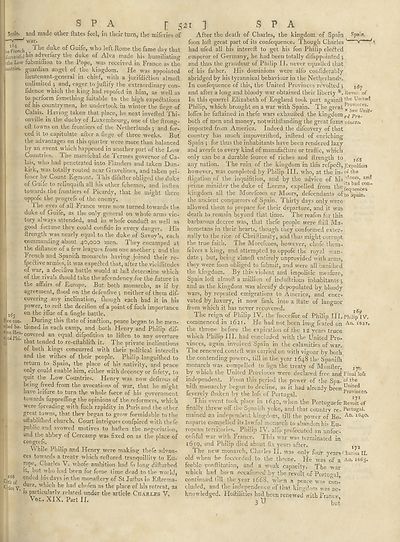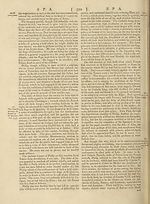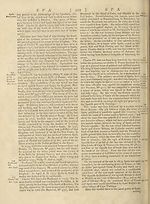Encyclopaedia Britannica, or, a Dictionary of arts, sciences, and miscellaneous literature : enlarged and improved. Illustrated with nearly six hundred engravings > Volume 19, Scripture-SUG
(569) Page 521
Download files
Complete book:
Individual page:
Thumbnail gallery: Grid view | List view

164
French
j'ucceisful
the Low
(untries
Spain-
SPA t 52
and made other ftates feel, in their turn, the miferies of
Spaift.
i(?5
ce con-
<1 led be-
1 enHen
ri Phi-
166
£ t'h of
rks Y.
1 he duke of Guife, who left Rome the fame day that
his adverfary the duke of Alva made his humiliating
fubmiffion to the Pope, was received in France as the
guardian angel of the kingdom. He was appointed
lieutenant-general in chief, with a jurifdi&ion almoft
unlimited ; and, eager to juflity the extraordinary con¬
fidence which the king had repofed in him, as well as
to perform fomething fuitable to the high expectations
of his countrymen, he undertook in winter the fiege of
Calais. Having taken that place, he next invefted Thi-
onville in the duchy of Luxembourg, one of the ftrong-
eft towns on the frontiers of the Netherlands ; and for¬
ced it to capitulate after a fiege of three weeks. But
the advantages on this quarter were more than balanced
by an event which happened in another part of the Low
Countries. 1 he marefchal de Termes governor of Ca¬
lais, who had penetrated into Flanders and taken Dun¬
kirk, was totally routed near Gravelines, and taken pri-
foner by Count Egmont. This difafter obliged the duke
of Guife to relinquifh all his other fchemes, and haften
towards the frontiers of Picardy, that he might there
oppofe the progrefs of the enemy.
1 he eves ot all France were now turned towards the
duke of Guife, as the only general on whofe arms vic¬
tory ahvays attended, and in whofe conduft as well as
good fortune they could confide in every dano-er. His
flrength was nearly equal to the duke of Savoy’s, each
commanding about 40,000 men. They encamped at
the diftance of a few leagues from one another ; and the
French and Spanifh monarchs having joined their re-
fpective armies, it was expetted that, after the viciffitudes
of war, a decifive battle would at lad determine which
or the rivals fhould take the afcendency for the future in
the affairs of Europe. But both monarchs, as if by
agreement, flood on the defenfive •, neither of them dif-
covering any inclination, though each had it in his
power, to reft the decifion of a point of fuch importance
on the ilfue of a fingle battle.
During this flate of inaction, peace began to be men¬
tioned in each camp, and both Henry and Philip dif-
covered an equal difpofition to liften to anv overture
that tended to re-eftabhfti it. 1 he private inclinations
of both kings concurred with their political interefts
and the wifhes of their people. Philip languifhed to
return to Spain, the place of his nativity, and peace
only could enable him, either with decency or fafetv, to
quit the Low Countries. Henry was now defirous of
being freed from the avocations of war, that he might
have ieifure to turn the whole force of his government
towards fuppreffing the opinions of the reformers, which
were fpreading with fuch rapidity in Paris and the other
great towns, that they began to grow formidable to the
eftablifhed church. Court intrigues confpircd with thefe
public and avowed motives to batten the negociation,
and the abbey of Cercamp was fixed on as the place of
congrefs.
\vhile Philip and Henry were making thefe advan¬
ces towards a treaty which reftored tranquillity to Eu¬
rope, Charles V. whofe ambition had fo long difturbed
k, but who had been for forae time dead to the world,
ended his days in the monaftery of St Juftus in Eftrema-
dura, which he had chofen as the place of his retreat, as
is particularly related under the article Charles V.
Vet. XIX. Part II.
i ] SPA
After the death of Charles, the kingdom of Spain
foon loft great part of its confequence. Though Charles
had ufed all his intereft to get his fon Philip eledted
emperor of Germany, he had been totally difappointed
and thus the grandeur of Philip II. never equalled that
of his father. His dominions were alfo confiderably
abridged by his tyrannical behaviour in the Netherlands.
In confequence of this, the United Provinces revolted j
and after a long and bloody war obtained their liberty Revoc of
In this quarrel Elizabeth of England took part againft die United
Philip, which brought on a war with Spain. The great
Ioffes he fuftained in thefe wars exhaufted the kingdom prg_
both of men and money, notwithftanding the great fums vincts.
imported from America. Indeed the difeovery of that
country has much impoverithed, inftead of enriching
Spain ; for thus the inhabitants have been rendered lazy
and averfe to every kind of manufadlure or traffic, which
only can be a durable fouree of riches and ftrength to Il?g
any nation. The ruin of the kingdom in this refpedt, Expullkni
however, was completed by Philip III. who, at the in-of the
ftigation of the inquifition, and by the advice of his.Nloors’ aT1tJ
prime minifter the duke of Lerma, expelled from the
kingdom all the Morefcoos or Moors, defeendants nf>„
1 . . j t lequence
kingdom all the Morefcoes or Moors, defeendants of to Spain.
the ancient conquerors of Spain. Thirty days only were
allowed them to prepare for their departure, and it was
death to remain beyond that time. The reafon for this
barbarous decree was, that thefe people were ftill Ma¬
hometans in their hearts, though they conformed exter¬
nally to the rite of Chriftianity, and thus might corrupt
the true faith. 'The Morefcoes, however, chofe them-
Lives a king, and attempted to oppofe the royal man¬
date ; but, being almoft entirely unprovided with arms,
they were foon obliged to fubmit, and were all baniihed
the kingdom. By this violent and impolitic meafure,
Spain loft almoft a million of induftrious inhabitants ;
and as the kingdom was already depopulated by bloody
wars, by repeated emigrations to America, and ener¬
vated by luxury, it now Tank into a ftate of languor
from which it has never recovered.
Hie reign of Philip IV. the fucceffor of Philip III. Philip IV.
commenced in 1621. He had not been long feated on An. 1621.
the throne before the expiration of the 12 years truce
which Philip III. had concluded with the United Pro¬
vinces, again involved Spain in t he calamities of war.
The renewed conteft was carried on with vigour by both
the contending powers, till in the year 1648 the Spaniffi
monarch was compelled to fign the treaty of Munfter, I7b
by which the United Provinces were declared free and Final lofs
independent. From this period the power of the Spa- of the
niffi monarchy began to decline, as it had already been Umteci
feverely ftiaken by the lofs of Portugal. ^ Province?.
This event took place in 1640, when the Poftuguefe Revokof
finally tiirew off the Spanilh yoke, and that country re- Pvitugal.
mained an independent kingdom, till the power of Bo- An’ i640,
naparte compelled its lawful monarch to abandon his Eu¬
ropean territories. ^ Philip IV. alfo profecuted an unfuc-
cefsful war with France. This war was terminated in
1659, and Philip died about fix years after. ,7i
I he new monarch, Lnarles 11, was only four years 1 harlej II.
old when he fucceeded to the throne. He was of a An. 1665.
feeble conftitution, and a weak capacity. The war
which had. been oecafioned by the revolt of Portugal
continued till the year 1668, when a peace was (Ton-
eluded, and the independence of that kingdom was ac¬
knowledged. Hoftilities had been reneweefwith Fram e
3 bd
French
j'ucceisful
the Low
(untries
Spain-
SPA t 52
and made other ftates feel, in their turn, the miferies of
Spaift.
i(?5
ce con-
<1 led be-
1 enHen
ri Phi-
166
£ t'h of
rks Y.
1 he duke of Guife, who left Rome the fame day that
his adverfary the duke of Alva made his humiliating
fubmiffion to the Pope, was received in France as the
guardian angel of the kingdom. He was appointed
lieutenant-general in chief, with a jurifdi&ion almoft
unlimited ; and, eager to juflity the extraordinary con¬
fidence which the king had repofed in him, as well as
to perform fomething fuitable to the high expectations
of his countrymen, he undertook in winter the fiege of
Calais. Having taken that place, he next invefted Thi-
onville in the duchy of Luxembourg, one of the ftrong-
eft towns on the frontiers of the Netherlands ; and for¬
ced it to capitulate after a fiege of three weeks. But
the advantages on this quarter were more than balanced
by an event which happened in another part of the Low
Countries. 1 he marefchal de Termes governor of Ca¬
lais, who had penetrated into Flanders and taken Dun¬
kirk, was totally routed near Gravelines, and taken pri-
foner by Count Egmont. This difafter obliged the duke
of Guife to relinquifh all his other fchemes, and haften
towards the frontiers of Picardy, that he might there
oppofe the progrefs of the enemy.
1 he eves ot all France were now turned towards the
duke of Guife, as the only general on whofe arms vic¬
tory ahvays attended, and in whofe conduft as well as
good fortune they could confide in every dano-er. His
flrength was nearly equal to the duke of Savoy’s, each
commanding about 40,000 men. They encamped at
the diftance of a few leagues from one another ; and the
French and Spanifh monarchs having joined their re-
fpective armies, it was expetted that, after the viciffitudes
of war, a decifive battle would at lad determine which
or the rivals fhould take the afcendency for the future in
the affairs of Europe. But both monarchs, as if by
agreement, flood on the defenfive •, neither of them dif-
covering any inclination, though each had it in his
power, to reft the decifion of a point of fuch importance
on the ilfue of a fingle battle.
During this flate of inaction, peace began to be men¬
tioned in each camp, and both Henry and Philip dif-
covered an equal difpofition to liften to anv overture
that tended to re-eftabhfti it. 1 he private inclinations
of both kings concurred with their political interefts
and the wifhes of their people. Philip languifhed to
return to Spain, the place of his nativity, and peace
only could enable him, either with decency or fafetv, to
quit the Low Countries. Henry was now defirous of
being freed from the avocations of war, that he might
have ieifure to turn the whole force of his government
towards fuppreffing the opinions of the reformers, which
were fpreading with fuch rapidity in Paris and the other
great towns, that they began to grow formidable to the
eftablifhed church. Court intrigues confpircd with thefe
public and avowed motives to batten the negociation,
and the abbey of Cercamp was fixed on as the place of
congrefs.
\vhile Philip and Henry were making thefe advan¬
ces towards a treaty which reftored tranquillity to Eu¬
rope, Charles V. whofe ambition had fo long difturbed
k, but who had been for forae time dead to the world,
ended his days in the monaftery of St Juftus in Eftrema-
dura, which he had chofen as the place of his retreat, as
is particularly related under the article Charles V.
Vet. XIX. Part II.
i ] SPA
After the death of Charles, the kingdom of Spain
foon loft great part of its confequence. Though Charles
had ufed all his intereft to get his fon Philip eledted
emperor of Germany, he had been totally difappointed
and thus the grandeur of Philip II. never equalled that
of his father. His dominions were alfo confiderably
abridged by his tyrannical behaviour in the Netherlands.
In confequence of this, the United Provinces revolted j
and after a long and bloody war obtained their liberty Revoc of
In this quarrel Elizabeth of England took part againft die United
Philip, which brought on a war with Spain. The great
Ioffes he fuftained in thefe wars exhaufted the kingdom prg_
both of men and money, notwithftanding the great fums vincts.
imported from America. Indeed the difeovery of that
country has much impoverithed, inftead of enriching
Spain ; for thus the inhabitants have been rendered lazy
and averfe to every kind of manufadlure or traffic, which
only can be a durable fouree of riches and ftrength to Il?g
any nation. The ruin of the kingdom in this refpedt, Expullkni
however, was completed by Philip III. who, at the in-of the
ftigation of the inquifition, and by the advice of his.Nloors’ aT1tJ
prime minifter the duke of Lerma, expelled from the
kingdom all the Morefcoos or Moors, defeendants nf>„
1 . . j t lequence
kingdom all the Morefcoes or Moors, defeendants of to Spain.
the ancient conquerors of Spain. Thirty days only were
allowed them to prepare for their departure, and it was
death to remain beyond that time. The reafon for this
barbarous decree was, that thefe people were ftill Ma¬
hometans in their hearts, though they conformed exter¬
nally to the rite of Chriftianity, and thus might corrupt
the true faith. 'The Morefcoes, however, chofe them-
Lives a king, and attempted to oppofe the royal man¬
date ; but, being almoft entirely unprovided with arms,
they were foon obliged to fubmit, and were all baniihed
the kingdom. By this violent and impolitic meafure,
Spain loft almoft a million of induftrious inhabitants ;
and as the kingdom was already depopulated by bloody
wars, by repeated emigrations to America, and ener¬
vated by luxury, it now Tank into a ftate of languor
from which it has never recovered.
Hie reign of Philip IV. the fucceffor of Philip III. Philip IV.
commenced in 1621. He had not been long feated on An. 1621.
the throne before the expiration of the 12 years truce
which Philip III. had concluded with the United Pro¬
vinces, again involved Spain in t he calamities of war.
The renewed conteft was carried on with vigour by both
the contending powers, till in the year 1648 the Spaniffi
monarch was compelled to fign the treaty of Munfter, I7b
by which the United Provinces were declared free and Final lofs
independent. From this period the power of the Spa- of the
niffi monarchy began to decline, as it had already been Umteci
feverely ftiaken by the lofs of Portugal. ^ Province?.
This event took place in 1640, when the Poftuguefe Revokof
finally tiirew off the Spanilh yoke, and that country re- Pvitugal.
mained an independent kingdom, till the power of Bo- An’ i640,
naparte compelled its lawful monarch to abandon his Eu¬
ropean territories. ^ Philip IV. alfo profecuted an unfuc-
cefsful war with France. This war was terminated in
1659, and Philip died about fix years after. ,7i
I he new monarch, Lnarles 11, was only four years 1 harlej II.
old when he fucceeded to the throne. He was of a An. 1665.
feeble conftitution, and a weak capacity. The war
which had. been oecafioned by the revolt of Portugal
continued till the year 1668, when a peace was (Ton-
eluded, and the independence of that kingdom was ac¬
knowledged. Hoftilities had been reneweefwith Fram e
3 bd
Set display mode to:
![]() Universal Viewer |
Universal Viewer | ![]() Mirador |
Large image | Transcription
Mirador |
Large image | Transcription
Images and transcriptions on this page, including medium image downloads, may be used under the Creative Commons Attribution 4.0 International Licence unless otherwise stated. ![]()
| Permanent URL | https://digital.nls.uk/192702679 |
|---|
| Attribution and copyright: |
|
|---|
| Description | Ten editions of 'Encyclopaedia Britannica', issued from 1768-1903, in 231 volumes. Originally issued in 100 weekly parts (3 volumes) between 1768 and 1771 by publishers: Colin Macfarquhar and Andrew Bell (Edinburgh); editor: William Smellie: engraver: Andrew Bell. Expanded editions in the 19th century featured more volumes and contributions from leading experts in their fields. Managed and published in Edinburgh up to the 9th edition (25 volumes, from 1875-1889); the 10th edition (1902-1903) re-issued the 9th edition, with 11 supplementary volumes. |
|---|---|
| Additional NLS resources: |
|

